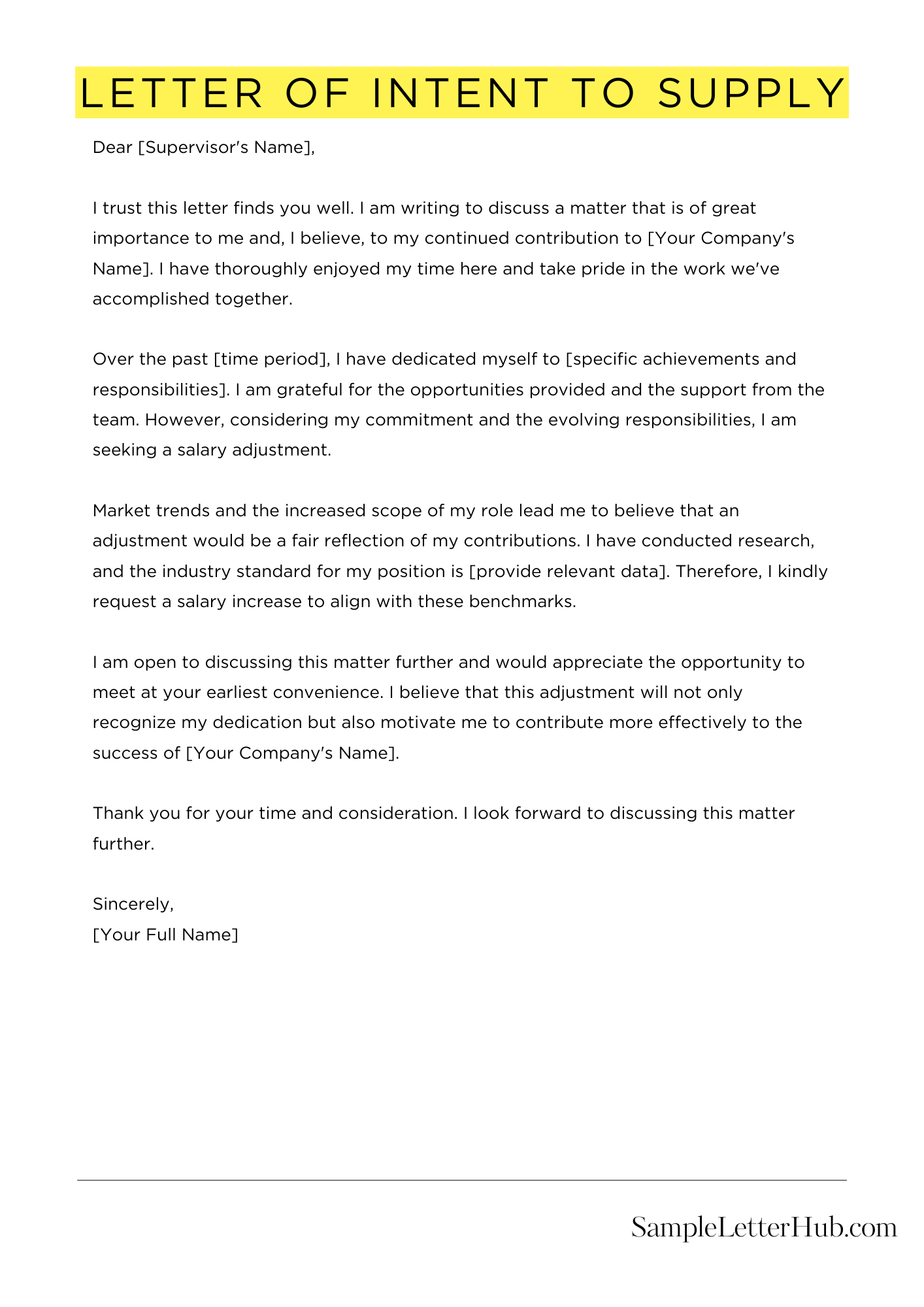A Letter of Intent to Supply is a document that expresses a supplier’s willingness to provide goods or services to a buyer. It is a non-binding agreement that outlines the basic terms of the supply, such as the quantity, price, and delivery date.
This article will provide you with templates, examples, and samples of Letters of Intent to Supply. These samples will help you write a letter that is clear, concise, and professional.
By using these samples, you can save time and ensure that your Letter of Intent to Supply is effective.
Letter Of Intent To Supply
Dear [Recipient Name],
I am writing to express our interest in supplying [product or service] to your company. We have been in business for [number] years and have a proven track record of providing high-quality products and services to our customers.
We are confident that we can meet your needs and exceed your expectations. We have a team of experienced professionals who are dedicated to providing the best possible service. We also have a state-of-the-art facility that allows us to produce high-quality products efficiently.
We are eager to learn more about your company and your specific needs. We would be happy to meet with you at your convenience to discuss our products and services in more detail.
Thank you for your time and consideration. We look forward to hearing from you soon.
Sincerely,
[Your Name]

How to Write Letter Of Intent To Supply
A letter of intent to supply is a formal document that outlines the terms and conditions of a proposed supply agreement. It is typically used when a buyer is interested in purchasing goods or services from a supplier and wants to express their intent to do so.
1. Introduction
The introduction should state the purpose of the letter and identify the parties involved. It should also include the date and place of the letter.
2. Statement of Intent
The statement of intent should clearly state the buyer’s intent to purchase goods or services from the supplier. It should also specify the quantity, quality, and price of the goods or services.
3. Terms and Conditions
The terms and conditions should outline the specific terms of the proposed supply agreement. This may include the payment terms, delivery terms, and warranty terms.
4. Exclusivity
The exclusivity clause should state whether or not the buyer is willing to purchase goods or services from other suppliers. This clause is important to protect the supplier’s interests.
5. Confidentiality
The confidentiality clause should state that the terms of the proposed supply agreement are confidential and should not be disclosed to third parties.
6. Acceptance
The acceptance clause should state that the supplier accepts the terms and conditions of the proposed supply agreement. It should also include the supplier’s signature and date.
FAQs about Letter Of Intent To Supply
What is a Letter of Intent to Supply?
A Letter of Intent to Supply is a non-binding agreement between a buyer and a supplier that outlines the terms of a potential supply contract. It is a preliminary document that expresses the parties’ intent to enter into a formal contract in the future.
What are the key elements of a Letter of Intent to Supply?
The key elements of a Letter of Intent to Supply typically include the following: the names of the buyer and supplier, the subject matter of the supply contract, the quantity and quality of the goods or services to be supplied, the price and payment terms, the delivery schedule, and the duration of the contract.
What is the purpose of a Letter of Intent to Supply?
The purpose of a Letter of Intent to Supply is to provide a framework for the parties to negotiate the terms of a formal supply contract. It helps to establish a common understanding of the parties’ expectations and to avoid misunderstandings or disputes later on.
When should a Letter of Intent to Supply be used?
A Letter of Intent to Supply should be used when the parties are still in the early stages of negotiations and have not yet reached a final agreement on all of the terms of the supply contract. It can also be used to secure a supplier’s commitment to supply goods or services at a certain price or on a certain schedule.
Is a Letter of Intent to Supply legally binding?
No, a Letter of Intent to Supply is not legally binding. It is a non-binding agreement that expresses the parties’ intent to enter into a formal contract in the future. However, it can be used as evidence of the parties’ intentions in the event of a dispute.

